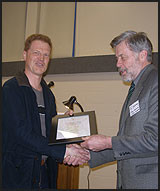 Peter de Lange receiving the Individual Award.The inaugural Network awards ceremony was held during the Network conference in Christchurch on Saturday 13th August 2005. Recipients of the awards were as follows:
Peter de Lange receiving the Individual Award.The inaugural Network awards ceremony was held during the Network conference in Christchurch on Saturday 13th August 2005. Recipients of the awards were as follows:
Individual Award
Peter de Lange
Peter de Lange, plant conservation scientist at the Department of Conservation in Auckland, won the award for making the greatest individual contribution to plant conservation. Peter was acknowledged for being at the forefront of threatened plant research for over 15 years.
School award
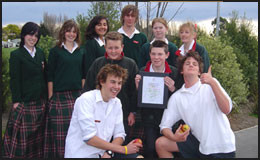 Pupils at Lincoln High School with the Schools award.Lincoln High School
Pupils at Lincoln High School with the Schools award.Lincoln High School
Lincoln High School won the award for the school making the greatest contribution to plant conservation by restoring a shingle pit. Sue Jarvis, teacher at Lincoln High School, received the award on behalf of the school and explained the process they had to follow in order to get the project going.
Council award
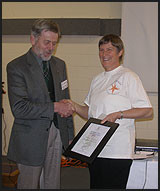 Sara Brill receiving the Council award on behalf of Environment Bay of Plenty Dune Care Programme.Environment Bay of Plenty
Sara Brill receiving the Council award on behalf of Environment Bay of Plenty Dune Care Programme.Environment Bay of Plenty
Environment Bay of Plenty won award for 2005 for the council making the greatest contribution to caring for plants. Environment Bay of Plenty received the recognition for restoring coastal dunes of the Bay of Plenty. “Their regional council has implemented the most important dune restoration and care programme in New Zealand” New Zealand Plant Conservation Network President Ian Spellerberg said in announcing the awards. “They have successfully planted up hundreds of kilometres of dune systems. This has seen hundreds of thousands of native plants restored to coastal areas. The contribution they are making to sustainable coastal management is world class” he said.
Plant Nursery Award
Oratia Native Plant Nursery
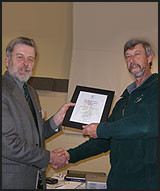 Geoff Davidson (of Oratia) receiving the Plant Nursery Award.Oratia Plant Nursery in Auckland was named the top plant nursery. Geoff Davidson received the award for his establishing and managing Oratia Plant Nursery which grows and sells over 1000 species of native plant.
Geoff Davidson (of Oratia) receiving the Plant Nursery Award.Oratia Plant Nursery in Auckland was named the top plant nursery. Geoff Davidson received the award for his establishing and managing Oratia Plant Nursery which grows and sells over 1000 species of native plant.
Lifetime Achievement Award
David Given
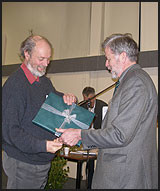 David Given receiving the Lifetime Achievement Award.David Given of Christchurch received a life time achievement award by the Network for his work over the past 30 years to promote and research native plants. David was the first person in New Zealand to develop threatened plant lists as a basis for prioritising effort for conservation. He has worked tirelessly to protect threatened plant life” Ian Spellerberg said at the awards ceremony.
David Given receiving the Lifetime Achievement Award.David Given of Christchurch received a life time achievement award by the Network for his work over the past 30 years to promote and research native plants. David was the first person in New Zealand to develop threatened plant lists as a basis for prioritising effort for conservation. He has worked tirelessly to protect threatened plant life” Ian Spellerberg said at the awards ceremony.
